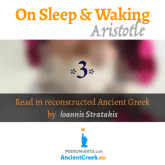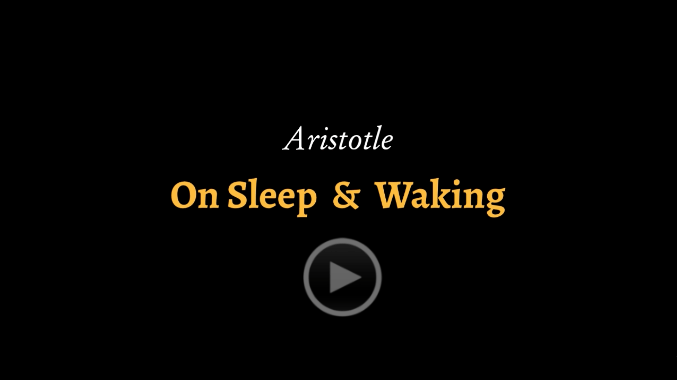• On Sleep & Waking •
• Aristotle •

Duration: 31 mins
Unabridged
Recorded: 2022
Price : $15
About “On Sleep & Waking" by Aristotle
In his work “On Sleep & Waking” (a.k.a. De Somno et Vigilia) Aristotle examines the named subjects (ὕπνος) and (ἐγρήγορσις) but also related to dreaming and divination. They both are common to body and soul, belong to the sense, follow each other and are found in all animals but not plants.
In the 2nd chapter the reason for sleeping and waking is considered. Of the senses, touch is common to all animals and a "common sense" collects the impressions of all the senses. This common one is affected by sleep and in turn restrains all the other senses. The reason of sleeping is the need for rest and organ recovery. The heart is the center of the senses and movement and sleep relates to it.
In the 3rd chapter the physical characteristics of sleep are considered. Sleep depends on nutrition and is the result of evaporation of food, as can be deducted from sleepinees following meals. Other causes are narcotics, diseases and toil.
You can follow the text of “On Sleep & Waking”, book 3 of “Parva Naturalia” by Aristotle, online at wikisource.org. A translation in English is found here.
about Aristotle
Aristotle (Gr.: Ἀριστοτέλης), one of the most important philosophers of Antiquity, was born in 385 BCE in Stageira of Chalkidike. Born in a rich family he had the opportunity to get high education. From 367 BCE on and for about twenty years, he studied philosophy in Athens by Plato and also taught in his Academy. After the death of Plato he moved to the city of Assus in Asia Minor, where he taught philosophy until 345 BCE., when he accepted an invitation by Theophrastus to teach in Mytilene. In 342 BCE King Philippus asked him to teach his 13 years old son, Alexander. After the death of Philippus Aristotle returned to Athens and established the “Lyceum”, where he set his teaching forth. However, after the death of Alexander in 323 BCE and having been accused by opponents for disrespect, he retired in Chalkis. He died in 322 BC from some stomach disease.
Aristotle left a lot of works. The works that have survived are distinguished in logical, physical, biological, psychological, metaphysical, moral, political, technological and various problems.
The Aristotelian works have included the following, which are not considered genuine: Physiognomy, About Miraculous Things Heard, About Colors, Mechanics, Rhetoric to Alexander and On Hearing.
About the audiobook
 The recording contains the complete, unabridged Ancient Greek text of “On Sleep & Waking”, book 3 of Parva Naturalia by Aristotle.
After purchase you will be able to download the relevant mp3 file.
The recording contains the complete, unabridged Ancient Greek text of “On Sleep & Waking”, book 3 of Parva Naturalia by Aristotle.
After purchase you will be able to download the relevant mp3 file.
You can listen to the first two paragraphs of chapter 1 of “On Sleep & Waking”, an audio sample of the present audiobook. Please, click on the play-button bellow and, if you wish, follow the Ancient Greek text lower on the page, or alternatively watch the video, which is provided with a quick translation in English. Thank you!
ΠΕΡΙ ΥΠΝΟΥ & ΕΓΡΗΓΟΡΣΕΩΣ
Περὶ δὲ ὕπνου καὶ ἐγρηγόρσεως ἐπισκεπτέον τίνα τε τυγχάνει ὄντα, καὶ πότερον ἴδια τῆς ψυχῆς ἢ τοῦ σώματος ἢ κοινά, καὶ εἰ κοινά, τίνος μορίου τῆς ψυχῆς ἢ τοῦ σώματος, καὶ διὰ τίν᾽ αἰτίαν ὑπάρχει τοῖς ζῴοις· καὶ πότερον ἅπαντα κεκοινώνηκεν ἀμφοτέρων, ἢ τὰ μὲν θατέρου τὰ δὲ θατέρου μόνον, ἢ τὰ μὲν οὐδετέρου τὰ δὲ ἀμφοτέρων· πρὸς δὲ τούτοις τί ἐστι τὸ ἐνύπνιον, καὶ διὰ τίνα αἰτίαν οἱ καθεύδοντες ὁτὲ μὲν ὀνειρώττουσιν ὁτὲ δὲ οὔ, ἢ συμβαίνει μὲν ἀεὶ τοῖς καθεύδουσιν ἐνυπνιάζειν, ἀλλ᾽ οὐ μνημονεύουσιν, καὶ εἰ τοῦτο γίγνεται, διὰ τίνα αἰτίαν γίγνεται· καὶ πότερον ἐνδέχεται τὰ μέλλοντα προορᾶν ἢ οὐκ ἐνδέχεται, καὶ τίνα τρόπον εἰ ἐνδέχεται· καὶ πότερον τὰ μέλλοντα ὑπ᾽ ἀνθρώπου πράσσεσθαι μόνον, ἢ καὶ ὧν τὸ δαιμόνιον ἔχει τὴν αἰτίαν, καὶ φύσει γίγνεται ἢ ἀπὸ ταὐτομάτου.
